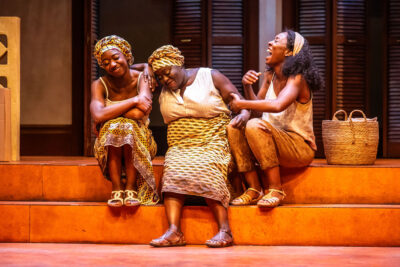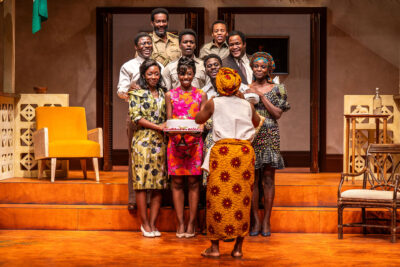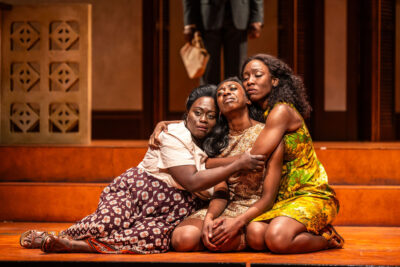When Mumbi Tindyebwa Otu first watched a production of Anton Chekhov’s Three Sisters, she couldn’t take her eyes off D’bi.young — the only Black woman on the stage.
“That was such a moment. I just kept staring at her and I was so intrigued by the fact that she was in this production. That stayed with me,” Otu says.
As one of three sisters herself, she’s always felt the most connected to Three Sisters out of any of Chekhov’s plays. Having grown up in Kenya and immigrating to Victoria, BC when she was 14, she also resonates with the play’s theme of longing for home.
Now, years later, Otu is directing an adaptation of Three Sisters with an all-Black cast, and a uniquely African twist on the classic story.

Photo by Dahlia Katz
Written by London playwright Inua Ellams, this adaptation of Three Sisters is set against the backdrop of the Biafran War, a deadly civil war in Nigeria that lasted from 1967 to 1970. Despite a massive death toll, estimated between 500,000 and 3 million, few people in the West know about the war, or the ethnic, political, and economic tensions that were brewing in Nigeria for generations.
For Otu, this meant it was even more important to bring this story to life. She first read Ellams’ adaptation of Three Sisters in 2020, right after she was appointed the artistic director of Obsidian Theatre, a company dedicated to uplifting Black artists in Canada.
“I read the play and I was just blown away,” she says, adding that she knew instantly that it would be the perfect collaboration for Obsidian and Soulpepper Theatre. “It is enlightening. It is heartbreaking. It is moving. It is hilarious.”
But it was no small undertaking. With a runtime of more than 3 hours, covering 4 years of complex African history, and exploring huge themes of colonialism and emancipation, there was a lot they needed to get right.
“It felt like we were really going to need a village to bring this story to life,” Otu says. In addition to finding the perfect cast, a historical consultant, cultural consultant, and dialect coaches were hired to make sure everything about the time period was portrayed accurately.

Photo by Dahlia Katz
While assembling “the village” for Three Sisters, Otu helmed several other productions at Obsidian Theatre, including the acclaimed 21 Black Futures, an ambitious anthology work from 21 multigenerational Black playwrights across the country, directed by 21 Black directors and performed by 21 Black actors.
For Otu, the project was about “widening the lens of the Black experience nationally”, a mission she has carried with her in all of her work, directing productions of Is God Is, Ma Rainey’s Black Bottom, and Sizwe Banzi is Dead.
“I really love that we keep telling stories that people are not familiar with and we keep expanding the lens of what the Black experience is, what Black history is,” Otu says. “There’s just so many stories about the African experience that are untold. I’m gonna go into the mine and try to dig for gold each time… find what don’t we know about, what’s not always being represented on stage.”
Otu stepped into her role in Obsidian Theatre at a pivotal moment in July 2020. The pandemic halted theatrical productions and shut the doors of performing arts venues for months on end. At the same time, the Black Lives Matter movement spurred a racial reckoning that called for equity, leadership opportunities, funding and representation for Black folks across industries, including the arts.
“People are eager to collaborate with companies like Obsidian because of everything that has happened over the last few years,” Otu says. “So that’s been an advantage, but it’s just a question of how long those opportunities will last.”

Photo by Dahlia Katz
Otu shares that it took a long time for her to recognize that there was a place for her in Canadian theatre. Growing up, plays that centred Black experiences were few and far between. Of those, not many were stories she could see herself in. This is why moments like Otu seeing D’bi.young on stage in Three Sisters can be life-changing.
“Your story matters. Your experience matters,” Otu says. “There’s space for all stories to exist on our stages. Until you tell that story, it may not be able to exist. You stepping into that space creates space for other people to now be able to step in.”
Otu has created that space, not only for herself, not only for the entire village around this production of Three Sisters, but for all the productions she’s led through Obsidian Theatre. Her dream is to be able to continue to tell varied, complex Black stories like Three Sisters even more frequently.
“My dream is a lot more stories like these,” Otu says. “Telling specific stories about what it means to be an African, what it means to be a woman, what it means to be Black, and to have them flood our stages…so that it’s not something that just happens once every couple of years, that it becomes something the city is excited to see every month.”
Three Sisters is on stage now at Soulpepper Theatre until March 24.




 Follow Us On Instagram
Follow Us On Instagram
